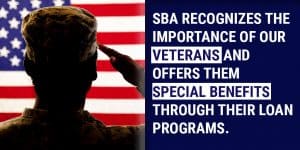The U.S. Small Business Administration (SBA) recognizes the importance of our veterans and offers them special benefits through their SBA loan programs.
SBA History
The SBA was created in 1953 to counsel, assist and protect the interests of small businesses. Eventually, the SBA established government guaranteed loan programs with benefits like longer repayment terms, lower down payments and more relaxed collateral requirements compared to conventional loans. The idea was to help businesses start and expand while stimulating the economy and helping to add jobs in the communities they serve.
The SBA has grown significantly and creates specialized programs that help small businesses in all areas. The SBA supports veterans by offering education, counseling and mentoring through various programs.
How the SBA 504 Loan Guarantee Program Works
The SBA does not make direct loans to small businesses. Rather, it sets the credit and eligibility guidelines for loans, which are then made by its partners (banks, certified development companies [such as Growth Corp] and other lending institutions). The SBA guarantees that these loans will be repaid, thus eliminating some of the risk to the lending partners. When a business applies for a 504 loan, it is actually applying for two loans: a commercial first mortgage with a bank or lending institution and a commercial second mortgage with a Certified Development Company.
What You’ll Need to Prepare in Advance
Veterans preparing to meet with their banker to discuss the 504 Loan Program should gather and share the documents listed below:
- Business Plan that includes managerial experience
- Three years of recent personal and business tax returns (if applicable)
- Three years of financial statements (if applicable)
Having these items handy will help a lender determine if your loan is eligible for SBA financing.
Paper Readiness
If possible, get a head start on completing it the required documentation. This will help expedite the loan process:
- Personal history and financial statement (SBA Form 912 and SBA Form 413)
- Business financial statements, including a P&L statement current within 90 days of your application (if applicable)
- One year of projections
- A list of ownership and affiliations
- Business certificate and license
- Past loan history
- Most recent business income tax return and most recent three years of personal income tax returns (if applicable)
- Resumes for each principal of the business (20% or more ownership)
- Business plan
- Business lease or correspondence from your landlord
If you are requesting financing for a franchise business, additional paperwork may be required.
SBA Eligibility
Most for-profit businesses qualify for the 504 Loan Program. However, the standard eligibility requirements are:
- Business owner(s) must be a U.S. citizen or resident alien with a green card
- For-profit business
- Any business structure (Sole Proprietorship, Partnership, Corporation, LLC, LLP, etc.)
- Any type of legitimate business (manufacturing, wholesale, service, professional, retail or agriculture)
- By SBA definition the business must be small. This generally means less than $15 million in net worth and less than $5 million in annual after-tax profits.
Creditworthiness Requirements
Personal and company credit histories are reviewed. If you have credit blemishes, prepare a written explanation as to why so SBA can get a full picture of the circumstances. Equity requirements typically call for borrowers putting in 10%-20% of their own capital, depending on the type of business and years of experience.
Additional SBA Resources for Veterans
Boots to Business – an entrepreneurial education and training program offered by SBA. The curriculum provides valuable assistance to transitioning Service members exploring business ownership or other self-employment opportunities by leading them through the key steps for evaluating business concepts and providing the foundation of knowledge required to develop a business plan. In addition, participants are introduced to SBA resources available to help access start-up capital and additional technical assistance.

